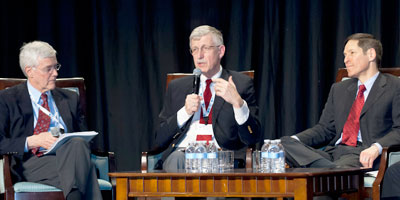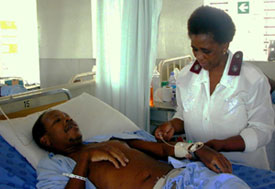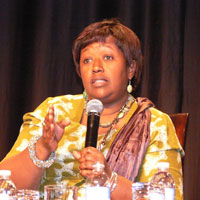Partnerships, capacity building needed to strengthen universities in developing nations
March / April 2013 | Volume 12, Issue 2
Global health partnerships that consider local needs and context are vital to speeding research discoveries to people who need them most, according to speakers at the fourth annual meeting of the Consortium of Universities for Global Health (CUGH), held recently in Washington, D.C.
The era when experts from high-resource countries dropped briefly into developing countries to conduct a study or teach a skill should be relegated to the past, according to Rwandan Health Minister Dr. Agnes Binagwaho.
Such so-called parachute visits by U.S. scientists are no longer the norm in her country. "You used to come for two weeks and after that go back. Now you stay long-term to transfer capacity in a direct way," she noted.
CUGH, whose meeting attracted more than 1,300 participants from 56 nations, encourages equal partnerships between universities in developing nations and their wealthier counterparts, with the goal of reducing health disparities everywhere.
"We already have the knowledge to address most of the global health problems before us," said Dr. Keith Martin, who heads the CUGH Secretariat. "Our great challenge is to overcome the knowledge-implementation gap and breathe life into the solutions we already know will save millions of lives and billions of dollars."
One barrier to dissemination is developing country scientists' lack of access to current research findings. Binagwaho encouraged open-source publications noting that, otherwise, people in partner countries pay half their salaries just to read the latest journal articles.

Photo courtesy of CUGH
Research expertise must be built in developing countries to take
advantage of the "unprecedented" opportunities, NIH Director
Dr. Francis S. Collins (center) told attendees of the 2013
Consortium of Universities for Global Health meeting.
Solid evidence is needed to inform policymakers and demonstrate the effectiveness of program implementation, noted USAID Administrator Dr. Rajiv Shah. For instance, studies can determine whether vaccination programs are reaching enough children or if HIV-positive patients are adhering to treatment. "These are all massive data gaps and are undermining results," he said, adding that collaboration is helping address this. "More countries and more leaders around the world are now working together to solve these challenges."
It's also important to recognize the benefits of science as a diplomatic tool, suggested Dr. Harvey Fineberg, president of the U.S. Institute of Medicine. "Among America's most successful interventions abroad, there is nothing to compare with what we have done in global health."
It's vital the U.S. continue to expand global health activities as world populations face emerging infectious disease threats, according to CDC Director Dr. Thomas Frieden. The risks are multiplied by the speed with which pathogens spread around today's interconnected world, growing drug-resistance in bacteria and an increased risk of someone engineering pathogens for nefarious purposes, Frieden noted. "It's quite accurate to say that in some ways we face a perfect storm in vulnerability."

Photo by Marilyn Keegan/Photoshare
The Medical Education Partnership Initiative,
funded by PEPFAR and NIH, is transforming
Africa's medical schools to dramatically expand
the region’s medical and research workforce.
Investments in global health research and training can produce positive change, he added. "There's real value in helping countries to be healthy because they will be less unstable, to encourage countries to be more vibrant because they will be more productive and to encourage partnerships around the world because we gain knowledge, perspective and we're able to live together as a global community."
America's leadership in the battle against HIV/AIDS through the President's Emergency Plan for AIDS Relief (PEPFAR) has been a "game-changer," according to Frieden. In addition to saving countless lives, PEPFAR is also working to build sustainable local capacity through the Medical Education Partnership Initiative (MEPI). Managed by Fogarty and the Health Resources and Services Administration, MEPI is intended to transform Africa's medical schools and dramatically expand the continent's medical and research workforce.

Photo by Cathy Kristiansen
Partnerships are needed to build
research capacity in a sustainable
way, Rwandan Health Minister
Dr. Agnes Binagwaho told
attendees of the recent Consortium
of Universities for Global Health
(CUGH) conference.
Under MEPI, African participant organizations are encouraged to build ties with health, finance and education ministries to ensure program goals align with national priorities and efforts will be sustainable. U.S. Global AIDS Coordinator and PEPFAR head, Ambassador Eric Goosby, said this approach has spurred the desire of in-country political leadership to make global health capacity building "a priority and a political deliverable."
"That change in self-perception of our colleagues in-country, both political and professional, has created an opportunity for the realization of true capacity expansion and putting a medical delivery system in place," Goosby said.
Successful global health programs like MEPI are built on equal partnerships and respect, according to Binagwaho. She cautioned students from seeking global health postings just to glorify their resumes. "Global health is a tool for justice, to bring care in a more equitable manner across countries," she said. "It's not an exotic fashion."
Binagwaho said ideal global health collaborations involve learning by both partners. While many visiting scientists are experts in their fields, she maintained, they have lessons to learn in countries such as hers, about cultural context and other influences on health. Through reverse innovation, they may discover low-cost interventions that could be useful at home. "We have to recognize that global health is a two-way learning. Don't come and forget that I am an expert. Don't come to my country and forget that I can challenge you," Binagwaho cautioned. "Come and ask me where you can give me a hand to advance social justice."
More Information
To view Adobe PDF files,
download current, free accessible plug-ins from Adobe's website.